- Homepage
- Frailty syndrome
Frailty syndrome
Frailty syndrome is highly prevalent in the elderly; it means there
is a much greater risk of falls, hospitalization and loss of independence. What can be done to prevent it?
Disability is considered an outcome of frailty and not the cause.
I have my doubts about that but it is not good form to argue with the scientists. Having admitted that, should a disabling hip or knee condition impede your walking speed, in my humble opinion it would contribute to an increased risk of the premature development of frailty.
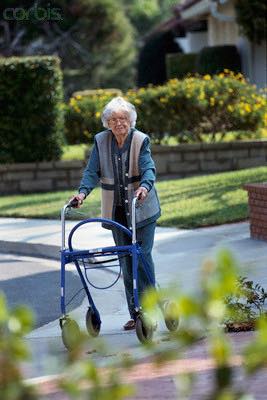 Prevent frailty
Prevent frailtyThis is a long and so-important subject; don't expect to get it down in a reading. Rather revisit it regularly making the appropriate changes to your lifestyle. Rome was not built in a day; nor will regaining your strength be simple. The page was last updated on 9th April, 2025.
Perhaps that knee is not treatable but if it is, get it sorted out. Have you tried a daily set of exercises, done in a disciplined fashion every single day?
The number of frail persons is expected to increase four times by 2050, largely due to our less physically active lifestyles and ultra refined diets that are deficient in vitamins, minerals and important phytonutrients.
Fried's definition of frailty
Doctors of every ilk have patients whom they intuitively realise are becoming frail. How does one define this more precisely and is there anything that can be done to prevent the insidious course of the condition?
Fried's definition of frailty is when and if you qualify for three or more of these five criteria[1]:
- Low grip strength
- Low energy
- Slowed walking speed
- Low physical activity
- Unintentional weight loss
Even if you have only one or two of these criteria then there is still a higher risk of progressing to frailty syndrome.
Other symptoms often associated with frail syndrome include fatigue and multiple chronic conditions such as diabetes.
Low grip strength
Your grip strength can be accurately defined using a dynamometer; but usually you know because you can no longer open bottles easily. It is one of the important criteria of impending frailty syndrome; improving your strength now will help prevent the progression of this nasty condition.
Here are some suggestions if you have a sense that your hands are becoming weak:
- Use a pair of secateurs regularly to pick flowers and prune your plants.
- Do not be anxious about managing a pair of scissors for cutting material.
- Weed regularly in the garden.
- Carry the groceries to the car yourself.
- Squeeze a tennis ball.
- For men regularly use a hammer, pliers and push a lawnmower.
Exhaustion
When everything becomes an effort and you have a sense that you cannot get going, that you have unusually low energy levels and feel weak and tired, then there are concerns about progression to frailty syndrome; should this state of exhaustion continue.
This is the time to have a medical checkup to test for conditions like anaemia and diabetes; and a visit to a dietician to examine your meal planning. Tea and toast does not constitute breakfast, needless to say.
Ask for a special focus on the four vitamins mentioned below that, if deficient in your diet will cause the rapid progression of frailty syndrome. Researchers found that it is far more effective to get them from your food than from supplements.
Mostly it's not difficult if you are willing to include small amounts of a wide array of different foods in your planning; a sprig of parsley for example. The alternative is too ghastly to contemplate.
Low physical activity
Low physical activity can be accurately defined but it is an expensive test, and generally we have an innate sense when becoming inactive.
Here are some suggestions:
- Take several short strolls every day; use a stick if necessary.
- Park the car further from the entrance to shops so that you must walk.
- Use the stairs rather than the elevator, holding firmly onto to the hand rail to prevent falls.
- Walk to nearby friends, shops and churches for example, rather than take the car.
- Join a swim group.
- If appropriate, use a bicycle.
Can you stand on one leg for ten seconds? If not this exercise will reduce the risk of falling by 50%. Do it whilst at the counter whilst waiting for the kettle to boil.
Slowness
Slowed walking speed is defined as taking more than 6 or 7 seconds to walk 15 feet (4.6m) at your normal pace; it is one of the strong indicators of progression to frailty syndrome.
Using a piece of chalk and a tape measure, mark out 15 feet; ask a friend to time how long it takes for you to walk that distance.
Suggestions to increase your walking speed:
- Use a stick so that you can step it out more confidently during your short walks; wear a hat but short sleeves; aim at least for 15-30 minutes exposure to sunshine for adequate vitamin D.
- Have that painful ankle and foot treated, if they are impediments; how are the knee and hip?
- Ask for specific exercises for those joints that are ailing and slowing you down.
- If extra pounds is what is slowing you down, make a serious effort to reduce, or if need be cut out altogether the refined carbohydrates in your diet; they and not fat are the most common causes of obesity.
Unintentional weight loss
Unintentional weight loss contributing to frailty syndrome is defined as ten pounds (4.5kg) in the last year. It is definitely time to consult your doctor for a checkup.
Report in particular any change of bowel habits.
The regular onset of diarrhoea contributes to malabsorption syndromes, which then cause malnutrition with concerns about anaemia; and the poor uptake of these four most important vitamins and minerals too.
Lower down we will discuss in some detail the four vitamins that have been found to have a vital function in the prevention of frailty syndrome.
Understanding the meaning of gluten may be important should you be intolerant to commercial bread.
Medically the condition is known as sarcopenia, or gradual loss of muscle mass and strength. It is thought to be caused by oxidative stress, the build up of dangerous reactive oxygen ions in the tissues.
Thus antioxidants like vitamin E and many photonutrients from the diet are an important part of the solution.
Frailty syndrome
"Old age is rather like another country. You will enjoy it more if you have prepared yourself before you go."
- B.F. Skinner
Frailty syndrome can be prevented by timeously starting a simple exercise program; and ensuring that your meals contains adequate levels of these four vitamins.
They are all to be found in nuts and seeds; your greens and citrus.
Researchers have found that they in particular are very important in preventing the early onset of frailty; we look at measures you can take to make sure you have adequate stores in your body.
The material expressed on this page is gleaned from the nutritional and environmental literature; it is clearly referenced. A plain distinction is made between the author's opinion and that which is scientifically proven. When in doubt consult your health professional.
To suggest a correction or clarification, write to Dr Bernard Preston here. Contact.
Take regular short walks
A return to strength can most of the time be achieved by indulging, most days in a walk in the sun; and ensuring that you get your eight to ten coloured foods. Then not only the vitamins are covered but also the host of micro-nutrients that we neither could nor should try and monitor; that would make us hopelessly neurotic.
For example you may have been intrigued by this page entitled does allicin fight infections but making certain you are getting enough of the nutrient would be overwhelming, even if you do suffer from regular sinusitis; but you could very easily add onions and garlic daily to your checklist.
Would it be that difficult to toss in a couple of tablespoons of chickpeas and a few leaves of one of the dark leafy-green vegetables like spinach or kale into your food every day? If you knew it would add years of vigour to your life, you would do it, I am sure.
Vitamin C is the easiest. A dash of freshly-squeezed lemon juice either in water, or on your salad, is so simple and will also revive your love of greens.
Vitamin E though is the hardest. That one you will need to work at. All four are vitally important.
If ever there was a case for prevention rather than a cure, it pertains to this insidious condition that causes such pain and disability. Soon dependency on others to care for you follows.
So here are these four important vitamins that will contribute greatly to stopping the onset of frailty syndrome in its tracks.
Vitamin B6
A diet deficient in vitamin B6, known as pyridoxine is strongly associated with the development of frailty syndrome.
Because it causes a form of anaemia, different to an iron deficiency, exhaustion is common, and of course chronically tired people, young or old are not likely to go out walking; nor do they have the inclination to prepare proper nutritious meals.
Tea and toast may fill the spaces but it will not provide the vitamin B6.
Vitamin B6 foods include, top of the pops, chickpeas. You could get a good dollop of pyridoxine every day from this authentic hummus recipe with a green salad; it takes less than five minutes to make in your own home at a fraction of the price.
Of equal importance, researchers have found that a low level of vitamin B6 is strongly associated with chronic inflammation in the body in diseases such as rheumatoid arthritis and inflammatory bowel disease [4].
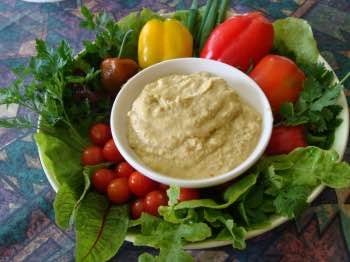 Divine green salad with homemade hummus
Divine green salad with homemade hummusSprinkle a handful of toasted sunflowers seeds on your divine green salad; or have a slice of 100 percent wholemeal bread on the side.
More on this subject at frailty and vitamin B6.
Vitamin C
When the world's sailors were dying like flies from a mystery disease known as scurvy, the British Limeys escaped the scourge thanks to a very smart doctor who recognised that enjoying freshly-squeezed citrus was the solution; limes were his remedy because they kept longer on voyages.
The first symptom not surprisingly of a deficiency of vitamin C is known as malaise; exhaustion and chronic tiredness. That leads directly to folk who are unlikely to have the energy to go out walking; frailty syndrome lies waiting, ready to strike.
What does frail mean?
What does frail mean? I am sure you've got it by now; loss of strength, energy and unintentional weight loss. Given a determined change of what granny eats and more physical activity, there is yet hope; she needs help.
Newsletter
Our newsletter is entitled "create a cyan zone" at your home, preserving both yourself and Mother Earth for future generations; and the family too, of course. We promise not to spam you with daily emails promoting various products. You may get an occasional nudge to buy one of my books.
Here are the back issues.
- Lifestyle and ideal body weight
- What are ultra-processed foods?
- Investing in long-term health
- Diseases from plastic exposure
- Intensive lifestyle management for obesity has limited value
- A world largely devoid of Parkinson's Disease
- The impact of friendly bacteria in the tum on the prevention of cancer
- There's a hole in the bucket
- Everyone is talking about weight loss drugs
- Pull the sweet tooth
- If you suffer from heartburn plant a susu
- Refined maize meal and stunting
- Should agriculture and industry get priority for water and electricity?
- Nature is calling
- Mill your own flour
- Bake your own sourdough bread
- Microplastics from our water
- Alternative types of water storage
- Wear your clothes out
- Comfort foods
- Create a bee-friendly environment
- Go to bed slightly hungry
- Keep bees
- Blue zone folk are religious
- Reduce plastic waste
- Family is important
- What can go in compost?
- Grow broad beans for longevity
- Harvest and store sunshine
- Blue zone exercise
- Harvest and store your rainwater
- Create a cyan zone at your home
Folate (vitamin B9)
Folate is usually associated predominantly with prevention of birth defects and anaemia. However because of its absolute necessity in the degradation of toxic homocysteine in the body, it is also important in protecting the integrity of the inner lining of the blood vessels.
Because folate is water-soluble one really should try to make sure there is some in every meal; certainly daily at least.
The homocysteine cardiovascular story tells it all; a decreased blood supply affects the whole body and certainly explains why a deficiency of folate contributes to exhaustion and low physical activity, two of the hallmarks of frailty syndrome.
For more about the foods rich in vitamin B9, read the benefits of folate page.
Frailty and vitamin B9 sums up this subject.
Vitamin E
Vitamin E is a potent antioxidant, mopping up free radicals that are formed in the body during normal tissue metabolism[3].
It is these free radicals, known in the research literature as "reactive oxygen species" that are thought to cause the gradual loss of muscle mass in the elderly; and unintentional weight loss.
The quadriceps muscle in the thigh is often targeted, making it difficult to stand up when seated; the walker and wheelchair soon follow.
Current research indicates that vitamin E not only prevents atrophy but also promotes muscle regeneration.
Read here for more about vitamin E and in which foods you can find it.
Vitamin D
New research done in the VITAL trial clearly shows that vitamin D should be added to our list; and it's easy to get. Just spend more time out of doors with a hat on.
Osteo-sarcopenia
Osteo-sarcopenia is another take on the same subject.
Osteoporosis (bone loss) and sarcopenia (muscle wasting) occur together.
When they occur together, there is a much greater risk of falls, fractures and death than in patients where only one or the other exists. Scientists point to the same three causes as for frailty.
- Aging
- Poor diet
- Sedentary lifestyle
How to prevent and reverse osteo-sarcopenia
As far as diet is concerned, more vitamin D must come to the forefront; and it is far better to get it from sunshine than your food. Again, a half hour walk in the sun with a hat on provides the magic duo that contribute greatly to preventing and reversing osteo-sarcopenia.
- Investing in long-term health explains how exercise also lowers blood glucose.
Creatine is an amino acid found primarily in cheese, seafood and red meat; it is deeply involved with energy production in muscle and bone cells. Rather get it from your diet than risk kidney damage from taking supplements.
Adequate calcium is also needed; and once again our recommendation is to make the easiest probiotic kefir to prepare in your own kitchen. The calcium is particularly well absorbed.
Also recommended are the many phenolic compounds found in vegetables. Eating a greater variety of coloured foods is highly recommended.
Take home
The take home from all this is to enjoy a walk every day; and enjoy food rich in many coloured fruits and vegetables, whole grains and unrefined carbohydrate.
Leg strength and longevity are closely intertwined; the couch, the car seat and the computer stool are all listed amongst the great enemies.
One remarkable side-benefit is that women get a 42% lower risk of getting breast cancer if they walk for 45 minutes daily; that's massive.
Diabetes
“Your time is limited, so do not waste it living someone else’s life”
- Steve Jobs
Because chronically raised blood sugar affects the nerve supply to muscles, they tend to waste away; sarcopenia. This is particularly true of the quadriceps in the thigh, leading to falls.
Diabetics are prone to all five of the criteria of frailty syndrome.
Interesting research shows that not one of a group of prediabetics went on to get the full blown disease if they took the active ingredient, curcumin in turmeric daily, compared to 16 percent in the placebo batch[5].
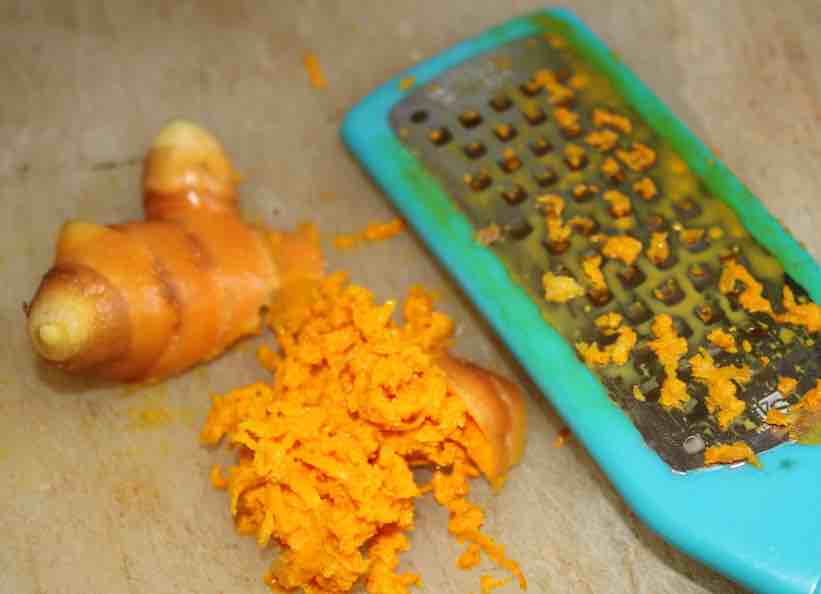 So easy to grow
So easy to growNut consumption
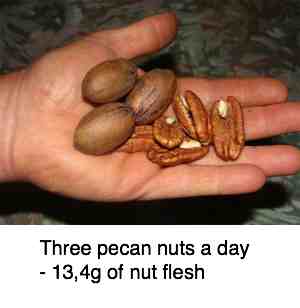 Eat nuts at least five times a week.
Eat nuts at least five times a week.There is strong evidence that a healthy diet helps prevent frailty syndrome; and it should include nuts.
After following 70,000 women for 24 years, researchers concluded those enjoying nuts five times per week, as compared with less than once a month have strong and consistent protection against frailty.
This protection included those enjoying peanuts regularly.
But alas those eating commercial peanut butter had no such protection. Researchers made no comment but it is probably because of either the sugar or the trans-fats that are added so that the oil will not separate out on top.
What does frail mean?
I hope you now understand what the word frail means; and caring for yourself and those in your family. I hope you can clearly see the foods that contain those four essential vitamins. If they are missing from granny's diet there is only one course ahead; a slide into weakness and misery.
Could you blend together a tub of hummus weekly for her to enjoy? Make sure she has limes and lemons in her fruit basket. Fresh dark-green leafy vegetables daily are not an option. These three are simple to obtain.
But the fourth, vitamin E is a bear. Almonds are one solution. I'm loathe to recommend supplements but they are better than nothing.
And the value of a daily walk is non-negotiable.
This kale and almonds salad is a great favourite from Our Green Kitchen; it's so simple to rustle up.
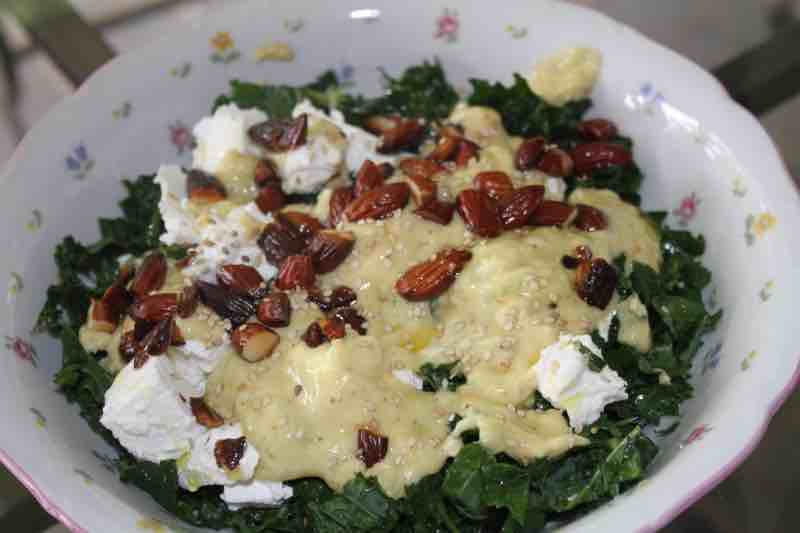
References
1. The Frailty Syndrome: Definition and Natural History
2. Low vitamin intake is associated with risk of frailty in older adults.
4. Vitamin B6: a challenging link between nutrition and inflammation in CVD.
5. Curcumin Extract for Prevention of Type 2 Diabetes
6. Long-Term
Consumption of Nuts in Relation to Risk of Frailty in Older Women
When browsing use right click and "Open Link in New Tab" or you may get a bad gateway signal.
Did you find this page interesting? How about forwarding it to a friendly book or food junkie? Better still, a social media tick would help.
- Homepage
- Frailty syndrome
Address:
56 Groenekloof Rd,
Hilton, KZN
South Africa
Website:
https://www.bernard-preston.com